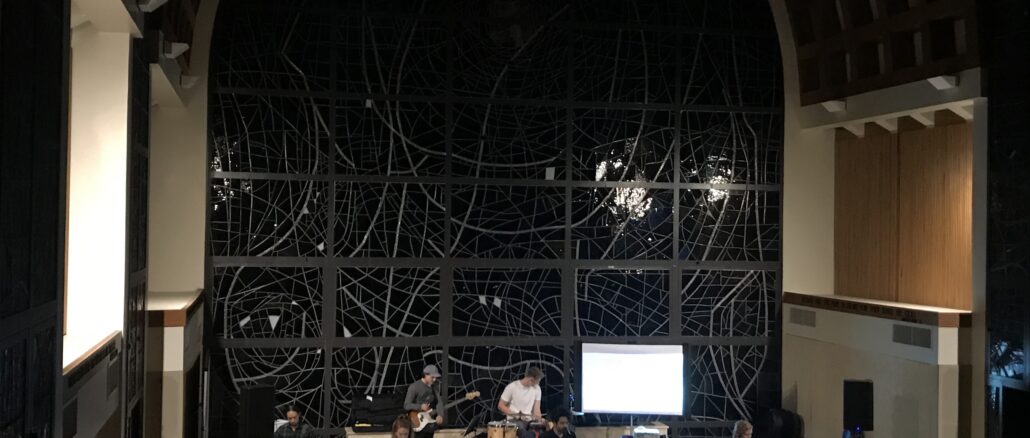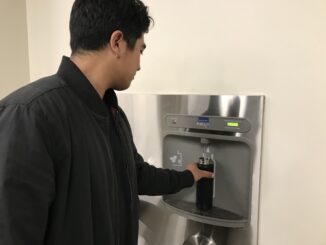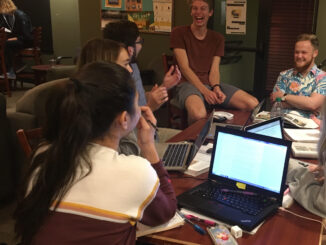
Freshman Kohlton Dannenberg drives 45 minutes into Los Angeles a few times a week.
Just to play the drums.
While his case is extreme, many non-music majors said they struggle to find ways to pursue their musical passions at Pepperdine.
A Pepp Post poll of 50 students found that 86 percent of non-music majors found it difficult to continue playing instruments once they got to Pepperdine, a result of poor spaces and outlets for students to practice or perform.
Undeclared freshman Juliane Yonano created a petition to bring awareness to the issue of non-music majors having no place to further their musical passions.
“For the entire first semester of college I hadn’t been able to practice [piano] that I had been doing since I was really little,” Yonano said. “This petition was also inspired by my other friends who play instruments that can’t be played in the dorms.”
While some students find loopholes, the poll found that more than half the students polled only get to play their instrument for an hour a week. Some give up their musical ambitions altogether.
Difficulties students face
Access to instruments and space to practice are two of the most daunting factors for students on campus.
With only two public pianos on campus — one in the cafeteria and one in the Sandbar — students who wish to play piano find it difficult to play, unless they wish to play in front of a large audience.
The bulk of the pianos on campus are located in music rooms in the music building, which are locked and only accessible to music majors, minors or students enrolled in a music class.
“We have to make sure we meet the academic and creative needs of our music program students according to their studio, ensemble, course, and scholarship assignments, and that means we need to prioritize the use of our facility for these particular students,” N. Lincoln Hanks, music professor and coordinator for the program, wrote in an email. “The pianos are overused already, and we have to pay for tuning all of them twice a year, and we incur additional costs for repairs.”
The Music Department spends several thousand a year repairing and tuning pianos, Hanks said.
“If we were to increase the amount of usage of these instruments by allowing students outside of our department to access and perform on these instruments, our tuning and maintenance costs would increase beyond our budgeted amount,” Hanks wrote.“The stewardship of these instruments must be kept primarily for the benefit of our students in the music programs, and the granted budget amount for equipment and facility maintenance is based upon those particular numbers of students.”
Noise complaints
Students who play in their rooms or public spaces often face noise complaints.
Liam Nixon, a sophomore music major with a voice emphasis, finds it difficult to practice anywhere outside the music building due to how loud he must project his voice.
“I would practice in my dorm but people complain,” Nixon said. “I’ve gotten a noise complaint before. I was singing in the shower.”
Yonano said she has faced multiple conversations with her suitemates about her passion for singing, which she must do in her dorm room.
“My roommate and I, we both sing a lot, and no one else in the suite really enjoys having that noise around,” Yonano said. “We’ve had meetings where they’ve told us to stop singing.”
Students struggle to find the appropriate place to practice their instruments, and many resort to playing it in their room despite the possibility of noise complaints.
Students who wish to play drums have it even harder, as there is no public space on campus for a student to practice the drums.
Dannenberg, a freshman business administration major, found the most accessible way for him to practice his drums is in a storage shed in Los Angeles.
“I mostly go there to prep for ‘The Well,’” Dannenberg said. “I’m playing for people at this school, I’m playing for this school, and I feel that I probably should be able to use the practice rooms.”
“The Well” is a musical worship opportunity for students that occurs once a week, and students who want to can audition for the worship team.
Confronting these difficulties
Yonano’s petition sparked interest amongst other students who run into the same issue.
“I have heard about a petition going around about access for music rooms for non-music majors,” said Brandon Harper, a senior media production major. “I think that is really important because personally I know dozens and dozens of people who like to play music and are interested in integrating jam sessions into actual productivity, and being able to have a place where they can not only record but have kind of a quiet place, safe place so to speak to make their music, so … petitions to really get something like that going and in motion from the students would be a really big push.”
Harper grew up playing the drums but once he got to Pepperdine and found himself without a drum kit he began producing electronic beats on his computer.
Hanks agreed that there needs to be more for non-music majors.
“There is a great need for non-music majors and minors to have access to pianos and creative spaces,” Hanks wrote in an email. “I would petition the Pepperdine and Seaver administrations to continue working on funding for a Student Event Center where students can access private practice rooms with pianos, a rehearsal space for rock band rehearsal and other creative spaces.”
Finding loopholes
Musicians generally tend to do whatever it takes to work on their craft and Pepperdine musicians are no different.
Non-music majors who have friends in the Music Department often will get their friends to let them into music rooms, normally later in the day when the music rooms aren’t as busy.
The poll found that 22 percent of non-music majors most often practice their instruments in a music room.
Nixon can attest to this.
“I’ve had a few people come and ask me to get in to a music room, and I will do it if I’m close with the person and trust them,” Nixon said. “I have two friends that are classically trained on the piano and I will let them in any time they want to play.”
Yonano also finds friends to let her into music rooms, and it is normally quite easy to access a room.
“I come in on the weekends and there’s always a row of piano rooms with no one in them,” Yonano said.
The need for musical opportunity
For some students, music serves as much more than just a hobby or pastime. There are psychological benefits to one’s mental health that accompanies the opportunity to play or even listen to music, said Lou Cozolino, a psychology professor at Pepperdine’s Graduate School of Education and Psychology.
“One of the reasons why music has such a powerful impact on our emotions is that the part of our brains that process music is biased toward the right hemisphere, which is the hemisphere that specializes in extreme emotional states, which is why music evokes so much emotion in people,” Cozolino said.
Students are faced with countless challenges, especially when it comes to adapting to a new college environment, and music is one of the constants that helps these adjustments, musicians said.
“It’s probably really painful, for someone who music is really important for, to be cut off from it,” Cozolino said.
Dannenberg said he feels the impact of being cut off from music, which he views as a necessity in his life.
“It’s like a make-it or break-it thing, like I need to be able to play drums,” Dannenberg said. “I wasn’t going to come [to Pepperdine] unless I could work out a way for me to be able to do that, which was me driving to Los Angeles.”
Yonano also believes that music plays a pivotal role in adjustments throughout life, especially the transition into college.
“Everything about college, I think music helps with it,” Yonano said. “If I didn’t have music here at college, it would have been really hard for me to adjust, because that’s been a constant; people grow up on music and then to have it taken away, especially if you play in instrument, that can be really harmful.”
Miles Campbell completed the reporting for this story in Jour 241 in Fall 2021 under the supervision of Dr. Christina Littlefield and Dr. Theresa de los Santos. Dr. Littlefield supervised the web version of the story.




